Table of contents
Hotel Competitive Analysis: 4 Easy Steps
The hospitality industry is very competitive. More people travel every year, new hotels keep opening, and prices rise, so you must keep track of what your competitors offer. Conducting a hotel competitive analysis will help you stay ahead!
For example, over the past month, Hilton had more online mentions and higher reach than Marriott – 58k vs. 54k and 480M vs. 275M. However, Marriott was mentioned more on social media.
💡Quick Summary:
– Hotel competitive analysis is the process of studying your competitors’ strengths and weaknesses to understand your hotel’s position in the market.
– It helps you understand your market position, spot market trends, set a better pricing strategy and offers, improve your marketing, and find new ways to grow.
– You can do this kind of analysis using competitor analysis tools.
What is hotel competitive analysis?
In short, a hotel’s competitive analysis is a strategic process of evaluating the strengths and weaknesses of a hotel’s competition.
It allows you to benchmark your hotel’s performance and better understand your position in the market.
Although it may take some time, the right dedicated tools can help you perform competitor analysis more effectively.
Perform a hotel competitive analysis!
Why do you need a hotel competitive analysis?
There are many reasons why competitive analysis is essential for your hotel. Here are the most important ones:
Understand your position in the market: Compare your hotel to others, and find out what you do well and where you can improve.
Refine your pricing and offers: Learn about your competitor pricing and what packages or services they offer. This helps you set better prices and offers.
Improve your marketing: Discover how other hotels communicate with guests, what channels they use, their online reputation, and the brand image they build.
Find new opportunities to grow: Identify market segments or services that competitors overlook or where guest satisfaction is low, so you can stand out and attract more guests.
Discover your competitive edge!
How to analyze your hotel competitors? 4 Steps
Step 1: Identify competitive hotels
Use Google search strategically
The easiest and fastest way is to use Google. Type a phrase that most accurately reflects your hotel’s profile.
You can create this phrase based on your hotel’s competitive set.
The hotel’s competitive set (hotel comp set) is a group of hotels most likely to take business from you. When building your comp set, consider these four key factors:
✔️ Proximity – hotels that are close to you, even if they offer a slightly different experience
✔️ Positioning – hotels that provide the same experience or target the same type of guests
✔️ Price – hotels with similar rates to yours
✔️ Product – properties with similar room types, design, and amenities
This will help you find hotels competing for the same target market as you. For example:
Hotels in [location]
Luxury hotels [location], boutique hotels [location], family hotels [location]
Hotels under [your average nightly rate] in [location], cheap hotels in [location]
Hotels with conference rooms in [location], hotels with free breakfast in [location]
You can also try general search queries such as:
[Hotel name] competitors
[Hotel name] alternatives
The more precise your search query is, the more accurate your list of competitors will be.
This method is one of the easiest; however, the results depend heavily on each hotel’s SEO and marketing efforts, so it won’t always show you the most relevant competitors.
Ask the AI assistant
Another (and better!) way to identify competitors is by using the AI Brand Assistant.
This method is more reliable and data-driven.
First, you need to create an account 👉 here you can start a free trial!
Next, create a project using your hotel’s name and give the tool some time to collect data:
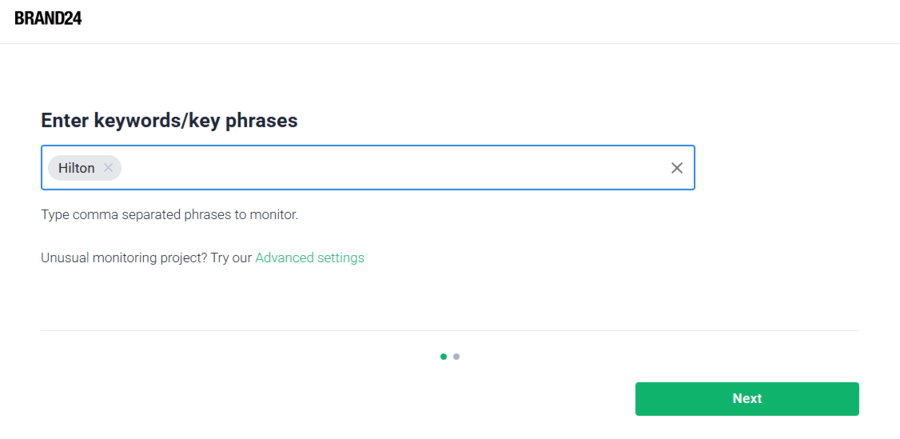
Then, go to the Brand Assistant and ask it the right question, for example, “Who are my main competitors?”:
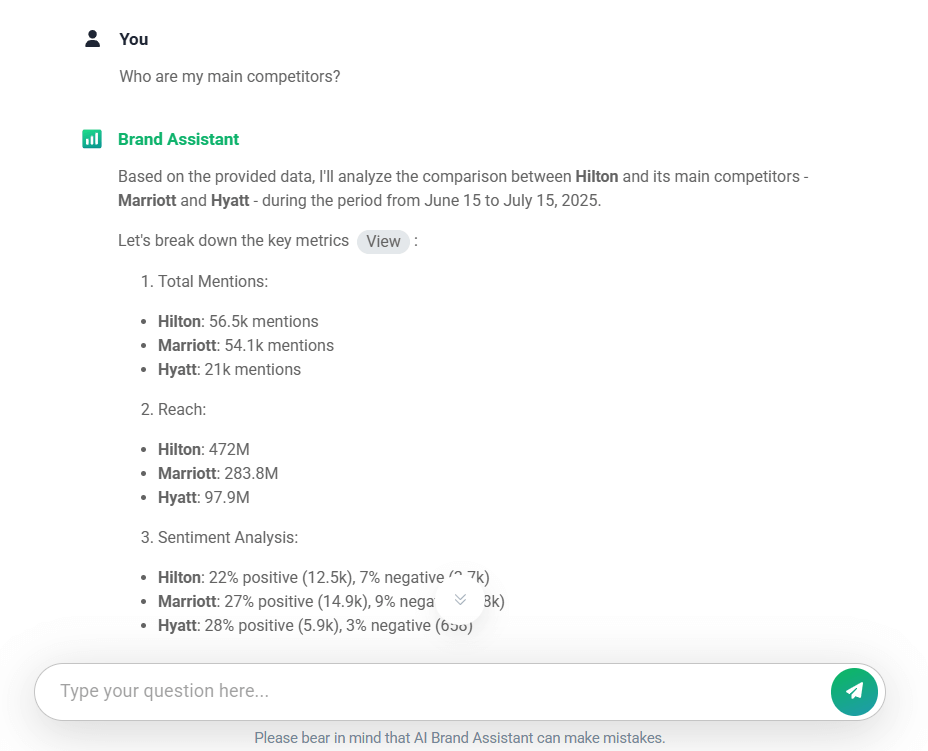
As you can see, the assistant will easily identify your most direct competitors.
Hilton’s biggest rivals are Marriott and Hyatt.
Start using Brand Assistant!
SEO tools
The third way to analyze your competitors is by using SEO tools.
These tools examine search engine results pages (SERPs) and provide detailed reports on competing websites and domains.
They not only help you discover online competitors you might have missed, but also:
See which keywords your competitors target
Check where their website backlinks come from
Track how their rankings change over time
That’s exactly how it looks in Semrush:
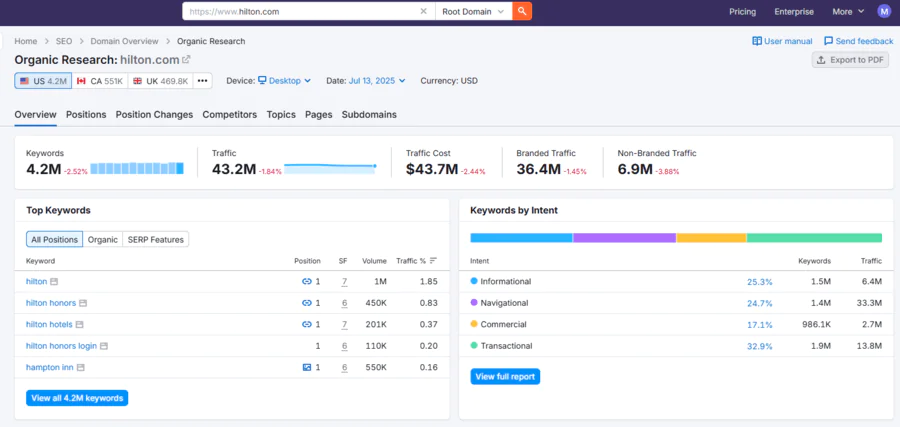
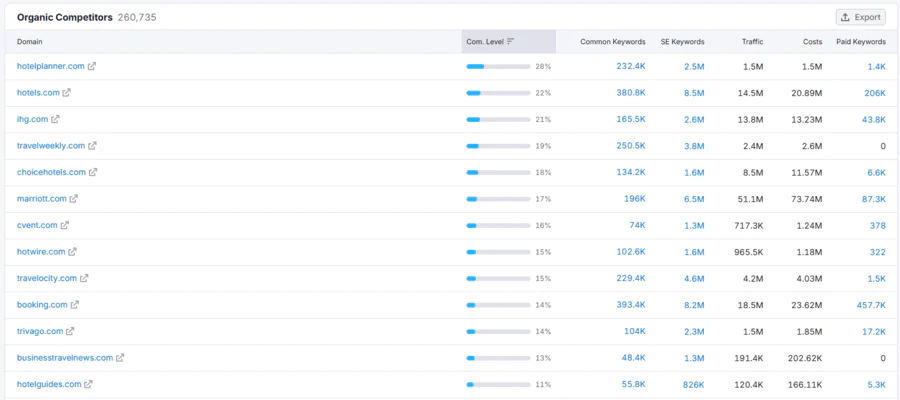
Step 2: Examine the most important information
When conducting a competitor analysis in the hotel industry, it is important to examine several key areas to get a full picture of how others operate and perform.
Some of them are:
Brand messaging: What is their unique selling point (USP), and how do they communicate with guests?
Pricing strategy: How do they price their rooms, and what packages or discounts do they offer?
Social media presence: How active and effective are they on social platforms?
⚠️ Social media is one of the most influential sources for travel inspiration. The way your hotel “looks” and communicates on social media can directly influence whether someone chooses you or your competitor instead.
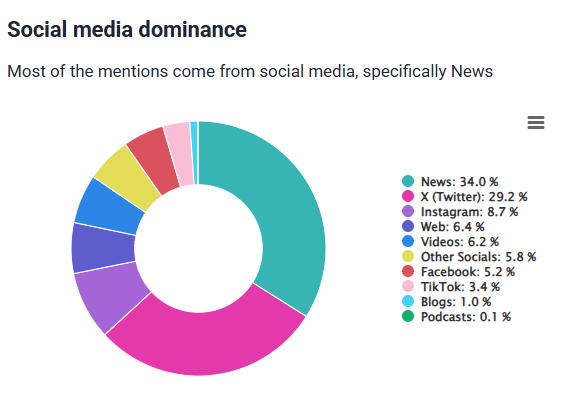
Advertising strategy: Where and how do they promote themselves?
- Brand sentiment: What do guests say about them online? Is the feedback mostly positive or negative? What is the sentiment like across different platforms?
⚠️ Sentiment analysis is essential since it shows how guests truly feel about a hotel’s service and experience. Understanding it lets you learn what people value most and what annoys them, giving you valuable insights to improve your offer.
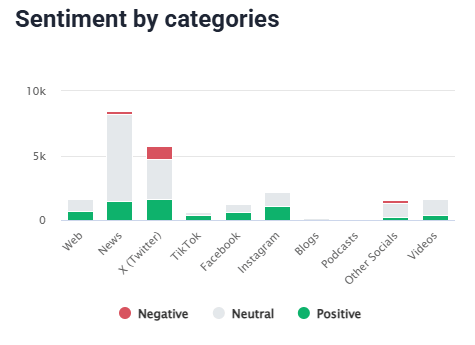
Customer reviews: What do online reviews say about them? What are the hotels’ strengths and weaknesses according to guests’ experience?
Share of voice: How much online attention do your competitors get compared to others in the market?
⚠️ Share of voice shows how visible and influential a hotel is online. The greater its share of voice, the more likely it is to attract guests.
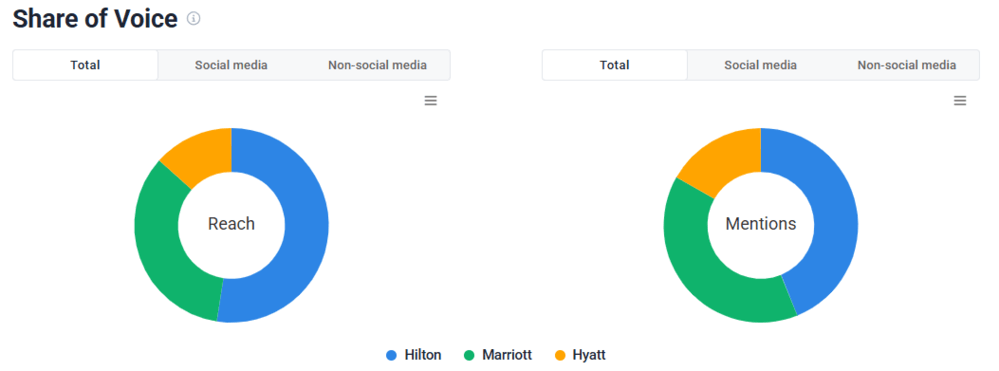
- SEO strategy: How visible are they in search engines? What keywords do they rank for?
⚠️ SEO helps the hotel be found online and drives more traffic to the website. Without SEO, even the best hotel can go unnoticed.
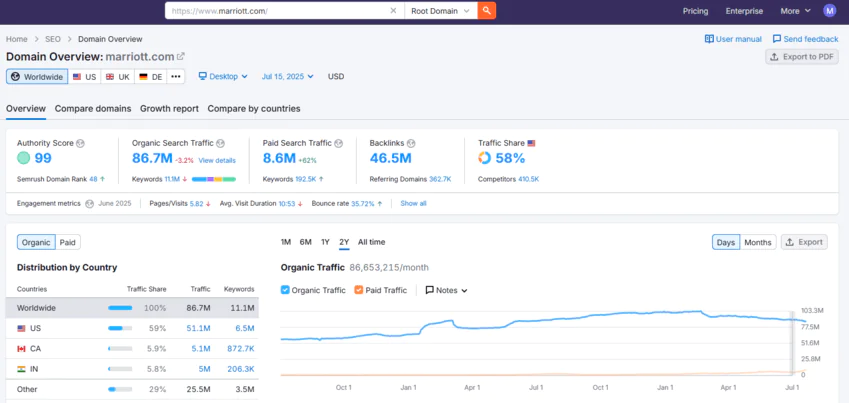
Sales channel: Where do they get most of their bookings – online booking channels, direct websites, or travel agents?
Start your hotel competitor analysis!
Step 3: Learn about their target audience
To truly understand your competitors, you perform target audience analysis. This means analyzing not just who they are but also what they talk about, when they’re active, and how they feel, etc.
That’s why in this step you should:
Discover what topics interest them the most
Look at the main subjects your competitor’s audience engages in. This will help you understand their interests, needs, and pain points.
How to do it?
Topic Analysis helps you discover which subjects they discuss most.
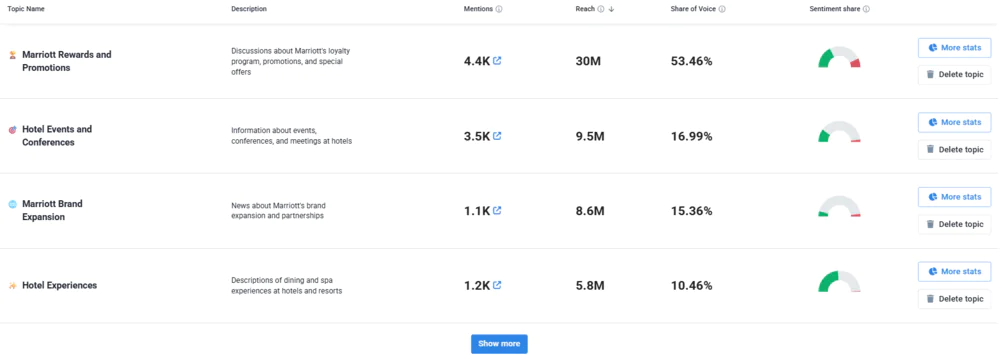
The main topics for Marriott:
1️⃣ Marriott’s loyalty program, promotions, and special offers (4.4k mentions, 20M reach)
2️⃣ Information about events, conferences, and meetings (3.5k mentions, 9.5M reach)
3️⃣ News about Marriott’s brand expansion and partnerships (1.1k mentions, 8.6M reach)
Check Topic Analysis for your competitors!
Find out when they’re most active
Identify the times when the audience is most active on different platforms. Knowing when your competitor’s audience engages the most can help you plan your marketing and social media activity to match or outperform them.
How to do it?
Hot Hours shows you when the best time to post on social media – when your audience is most active and likely to engage during the day.
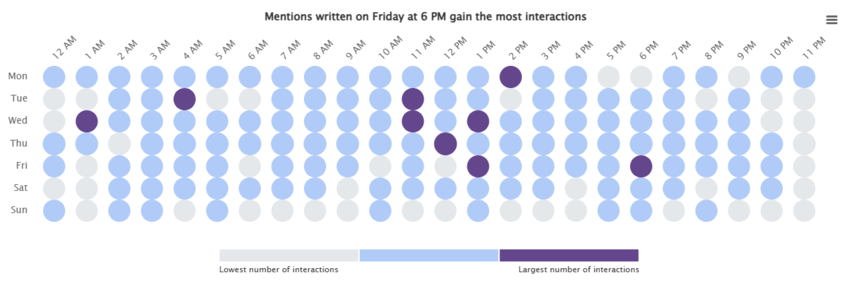
The best times for Marriott to post on Facebook:
✔️ Monday 2-3 PM
✔️ Tuesday 4-5 AM, 11 AM -12 PM
✔️ Wednesday 1-2 AM, 11 AM -12 PM, 1-2 PM
✔️ Thursday 12-1 PM
✔️ Friday 1-2 PM, 6-7 PM
Want to see when your competitors’ audience is most active?
Understand their emotions
Analyze the emotions your competitor’s audience expresses in their posts and reviews. Are theY happy or not?
How to do it?
Emotion Analysis reveals specific emotions (such as admiration, joy, anger, disgust, fear, and sadness) behind what people say about your competitor.
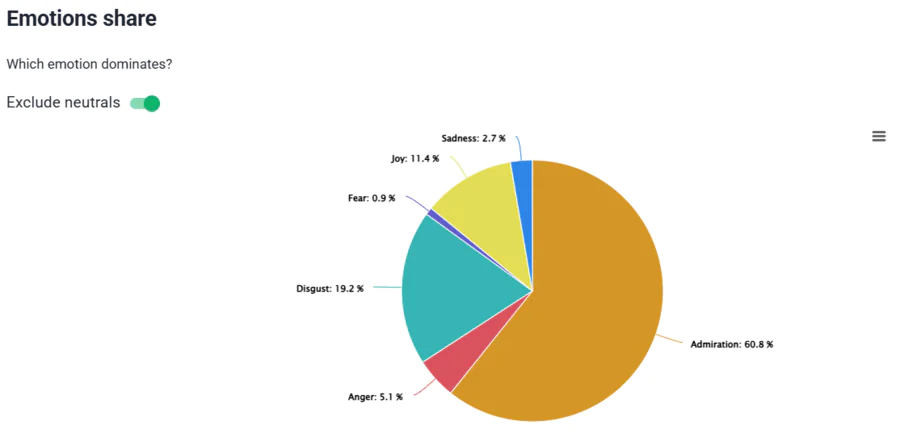
Emotions associated with Marriott (neutral emotions are not included):
✨ Admiration 60.8%
🤮 Disgust 19.2%
😄 Joy 11.4%
😡 Anger 5.1%
😞 Sadness 2.7%
😰 Fear 0.9%
See how guests feel about your competitors!
See where they come from
Find out where your competitor’s audience is coming from. This information helps you adjust your marketing to attract similar customers or explore new markets.
How to do it?
Use Geo Analysis to see the countries where people talk about your competitors and which regions they reach most effectively.
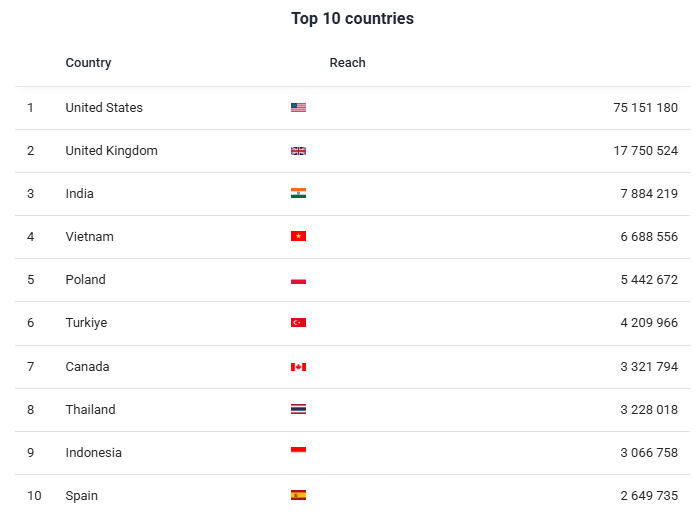
Marriott has the highest reach in the United States (over 75M).
Discover your competitors’ key markets!
Step 4: Benchmark with competitors
And finally, the last step is comparing your hotel’s performance with your competitors.
It might sound challenging, but with Brand24, it’s not!
It lets you benchmark your hotel using the most important business performance metrics, such as social media mentions and reach, sentiment, share of voice, Online Presence Score, and AVE.
Let’s compare Hilton to its two biggest direct competitors (Marriott and Hyatt):
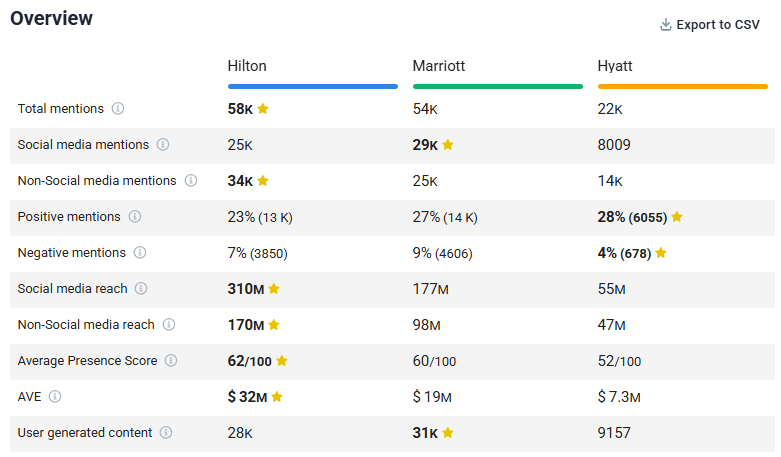
Hilton vs. Marriott vs. Hyatt:
✔️ Hilton has the biggest total number of mentions (58k) and reach (480M).
✔️ Marriott has the highest number of social media mentions (29K) and the most user-generated content (31k), suggesting an engaged and active online community.
✔️ Hyatt, despite having not that many mentions (22k), has the highest percentage of positive mentions (28%) and the lowest percentage of negative mentions (4%), showing strong brand reputation.
✔️ Hilton leads in advertising value equivalent (AVE) – $32M.
✔️ In terms of average presence score, Hilton (62/100) and Marriott (60/100) are close leaders, while Hyatt trails slightly at 52/100.
Compare, improve, stay ahead!
The best hotel competitor analysis tools to use in 2025
Effective hotel competitive analysis is only possible with the right tools. You’ll never be able to research, track, and analyze as precisely (and as fast) as AI analytics tools can.
Here’s my set of tools I recommend you use for hotel competitor analysis:
1️⃣ AI Brand Assistant (by Brand24): Your help for almost everything, from identifying your competitors to running detailed analyses. The Brand Assistant does literally everything for you! You just have to ask him.
2️⃣ Brand24: A must-have to track online mentions of your competitors. With advanced analysis and data-driven insights, you’ll see what’s being said, where it’s happening, understand the sentiment, and monitor your competitors’ online reputation. Plus, you can easily compare their results with yours with one click.
3️⃣ Semrush: A great addition to your analysis for understanding competitor website traffic and SEO. It shows which keywords your competitors use, how much traffic their sites get, and where their backlinks come from. This helps you better understand how their sales are driven.
Comparing hotels has never been easier – try Brand24 during a free trial!



